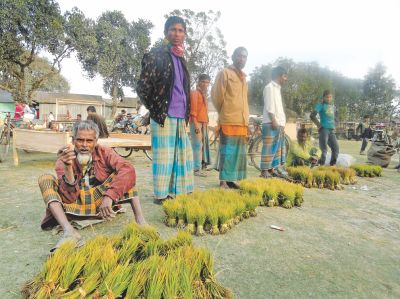Boro farmers face setback for acute seedling crisis

Few farmers are seen at Bhelabari Haat, a weekly market, in Aditmari upazila of Lalmonirhat as boro seedlings sell at high prices there in the peak cultivation season of the paddy. The photo was taken a few days ago.Photo: STAR
Boro farmers in eight northern districts under Rangpur division are facing problem in the peak cultivation season due to shortage of seedlings and its high prices following damage of seedbeds during persistent cold wave coupled with dense fog in winter.
Consequently, the target of boro cultivation in the division may not be achieved this year, said farmers and agriculture officials.
Boro cultivation in different areas of the division is getting delayed as the farmers now have to prepare fresh seedbeds and 35-40 days is required for maturity of seedlings, reports our Rangpur correspondent.
"I prepared boro seedbeds on my 10 decimal land, spending Tk 1,600 per decimal but it got damaged due to the cold injuries," said Nasir Uddin Liton, a farmer of Deuty village under Pirgachha upazila in the district.
The Department of Agriculture Extension (DAE) this season has fixed a target of producing 30,51,851 tonnes of boro rice from 7,60,366 hectares of land in eight districts under Rangpur division -- 5,36,719 tonnes from 1,30,589 hectares in Rangpur, 4,84,090 tonnes from 1,21,154 hectares in Gaibandha, 4,29,591 tonnes from 1,06,117 hectares in Kurigram, 2,29,972 tonnes from 54,805 hectares in Lalmonirhat, 3,20,895 tonnes from 77,899 hectares in Nilphamari, 6,80,693 tonnes from 1,74,678 hectares in Dinajpur, 1,34,463 tonnes from 34,322 hectares in Panchagarh and 2,35,427 tonnes from 60,802 hectares in Thakurgaon district.
About 15 to 30 percent seedbeds in Rangpur district have been affected due to severe cold wave and dense fog this year, DAE sources said.
“Last year I cultivated boro on 20 bighas of land but this year I cultivated it on only five bighas and much of my seedbeds got damaged and I failed to procure high yielding variety of saplings,†said Shajahan Mian, 54, a farmer of Machari village of Kaunia upazila in Rangpur district.
He urged the government for taking initiative to distribute boro sapling among marginal farmers across the country.
Md Sekendar Ali, additional director of DAE in Rangpur division, said, "Boro seedlings in many areas got damaged due to severe cold and dense fog but we are yet to estimate the total amount of damage in the division."
Our Dinajpur Correspondent reports: Around 40 percent seedbeds in Dinajpur and Joypurhat districts got damaged due to persistent cold and fog in the winter, said farmers and DAE officials.
To bring 1.74 lakh hectares of land under Irri-boro farming in 13 upazilas of Dinajpur with target to produce 6,80,693 tonnes of rice, nearly 13,000 hectares of land were prepared to produce seedlings since early December, said DAE sources.
In Joypurhat, at least 69,199 hectares of land was targeted fro Irri-boro cultivation to produce 2.70 lakh tonnes of rice and 4,280 hectares of land was prepared to produce seedlings for the purpose, they said.
But a large portion of these seedbeds were affected badly due to cold and fog and lack of sunlight.
Md Hannan Shah of Ambari village under Chirirbandar upazila of Dinajpur said that he prepared seedbed of 5 bigha land but 1/3 land gone damaged due to prolong cold along with fog.
Many farmers in the two districts prepared new lands to produce seedlings but it takes around 40 days for the saplings to mature for transplantation.
Farmers said mid-January to February is the best period for planting the Irri-boro seedlings.
"Rice production will fall if we fail to cultivate our land within the time," said Akramul Alam of Gopalganj village under Dinajpur Sadar upazila.
Our Lalmonirhat correspondent adds: Irri-boro farmers in five upazilas of Lalmonirhat district are worried due to the seedling crisis.
"I prepared boro seedbeds on 12 decimals of land to cultivate seven bighas land in this season. But 50 percent seedlings were damaged due to severe cold and heavy fog. So I have to purchase seedlings from the local market for high prices,†said farmer Yasin Miah, 48, at Harati village in Lalmonirhat Sadar.
"A bundle of 140 to 150 seedlings is selling at Tk 5 against Tk 3 last year in the local market. Some 450 to 500 bundles of seedlings are needed to cultivate one bigha (30 decimal) of land," he added.
A section of unscrupulous businessmen are selling seedlings for unusually high prices, said farmer Manoranjon Das, 44, at Bongram village in Lalmonirhat Sadar.
"I cultivated boro on 10 bighas of land against 25 bighas last year because of sapling crisis and its high price. Seedlings for farming in one bigha of land cost Tk 28,00 to 3,200 this year against Tk 1500 to 1800 last season," said Chitto Chandro Barmon, 48, of Bhadai village in Aditmari upazila.
The target of IRRI-boro cultivation in Lalmonirhat district may not be achieved this year due to the shortage of seedlings, said Abdul Mozid, deputy director of Lalmonirhat DAE.


 For all latest news, follow The Daily Star's Google News channel.
For all latest news, follow The Daily Star's Google News channel. 



Comments